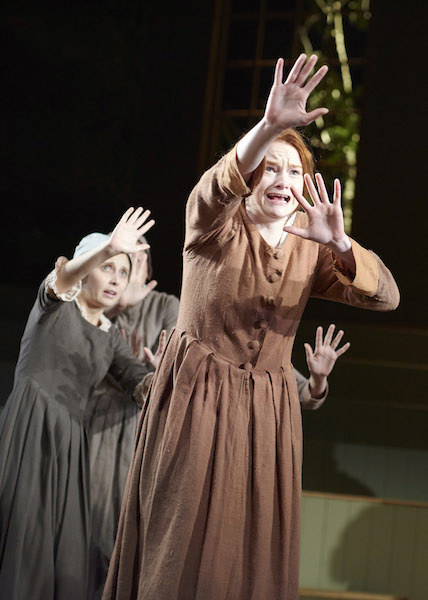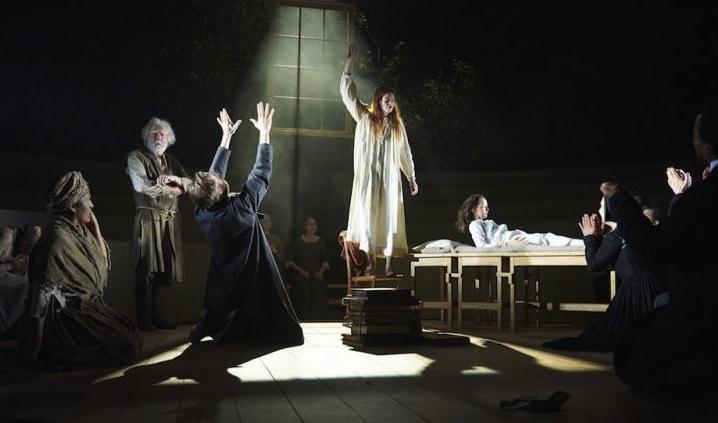Tom Morris has a strong feel for drama that explores the personal implications of fanaticism: his production of John Adams’s powerful opera The Death of Klinghoffer for New York's Met and the ENO, used a language of great simplicity that allowed the work’s most disturbing complexities to come through with formidable power. Once again with Arthur Miller’s The Crucible, an equally rich text, there is a stripped-down quality to his overall vision, supported by a generally superlative cast and finely tuned pacing. This works wonders with a play that explores the dark ways in which human frailties lead to collective madness and acts of individual heroism.
Robert Innes Hopkins’s set evokes the constant presence of the wild forest frontier that lies just beyond the edge of the struggling settlement of Salem. Although they are only mentioned once in the text – as perpetrators of murder – the native Americans are very present, in constant resonance with the demonic forces that the Puritans seek to expunge from their midst.
Part of the audience is on stage, in curved seating reminiscent of 17th- and 18th-century anatomical theatres, as if the play’s spectators were watching a dissection of the human drama that unfolds before them. Although Bristol’s Old Vic is a classic proscenium arch theatre, Morris has made sure we are drawn in and implicated in the twists and turns of the string of confessions, denunciations and acts of treason and bravery unfolding before us: in the court scene which opens the play’s second half, he has left the house lights half on, so that the whole house, not just the audience on stage, become directly involved.
 Jeffery Kissoon, as the implacable Judge Danforth, dominates the proceedings, as John Proctor (Dean Lennox Kelly) pleads for his wife and other victims of the witch-hunt. This is a part that could easily stumble into grand-guignol excess, but Kissoon manages a range of emotions with great sensitivity, bringing to the character a beguiling mix of the monstrous and the humane. Kelly is a strong presence too, though his take on the play’s conflicted hero isn’t as subtle as it might be, or as multifaceted as Neve McIntosh’s portrayal of his brave and loving wife Elizabeth: the weakness of the play’s last act, the only moment that the tension flags, may well derive from the less than convincing portrayal of the inner conficts that tear John Proctor apart. Or it just may be the near impossibility of following Act Three, with its spine-chilling climax as the hysteria-driven girls, led by Abigail Williams (played with scary duplicity by Rona Morrison, pictured above left ) blast Mary Warren's denunciation of their "fraud" wide apart.
Jeffery Kissoon, as the implacable Judge Danforth, dominates the proceedings, as John Proctor (Dean Lennox Kelly) pleads for his wife and other victims of the witch-hunt. This is a part that could easily stumble into grand-guignol excess, but Kissoon manages a range of emotions with great sensitivity, bringing to the character a beguiling mix of the monstrous and the humane. Kelly is a strong presence too, though his take on the play’s conflicted hero isn’t as subtle as it might be, or as multifaceted as Neve McIntosh’s portrayal of his brave and loving wife Elizabeth: the weakness of the play’s last act, the only moment that the tension flags, may well derive from the less than convincing portrayal of the inner conficts that tear John Proctor apart. Or it just may be the near impossibility of following Act Three, with its spine-chilling climax as the hysteria-driven girls, led by Abigail Williams (played with scary duplicity by Rona Morrison, pictured above left ) blast Mary Warren's denunciation of their "fraud" wide apart.
Morris and his company achieve an unforgettable coup de théatre at this key moment in the play, in a way that combines sound, screams and perfect physical theatre in an almost operatic way. This explosion of theatrical grace highlights the more conventionally blocked scenes in which characters stand motionless as if frozen in various postures that emphasise the limitations of the conventional stage. It's difficult to know if this is an intentional device, but the effect undermines the moments when the action flows more freely.
The casting is excellent, and the standard of acting uniformly high. Music and sound design from Dave Price and inspired lighting serve the high-tension drama well, subtly at times and with ear-splitting explosion when most needed.
In the week of Arthur Miller’s 100th anniversary, Tom Morris’s stirring production reminds us that the American writer is one of the very best playwrights of the 20th century. This is, as the director points out in his programme notes, a play with universal significance that speaks to us very clearly today. But it also says a great deal about America: the tortured relationship between wilderness and the idealistic attempts at civilising the untamed world, and the terror-inducing stranglehold of fundamentalist Christianity and the manichean world-view this entails. And last but not least, the play mirrors, in a deep and subversive way, the story of The Passion. That all these layers of meaning are revealed with great tact is an indication of the production's many qualities.













Add comment